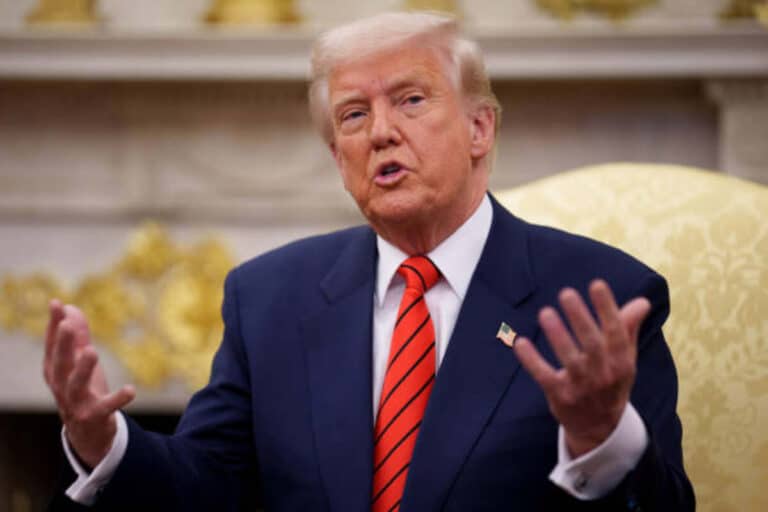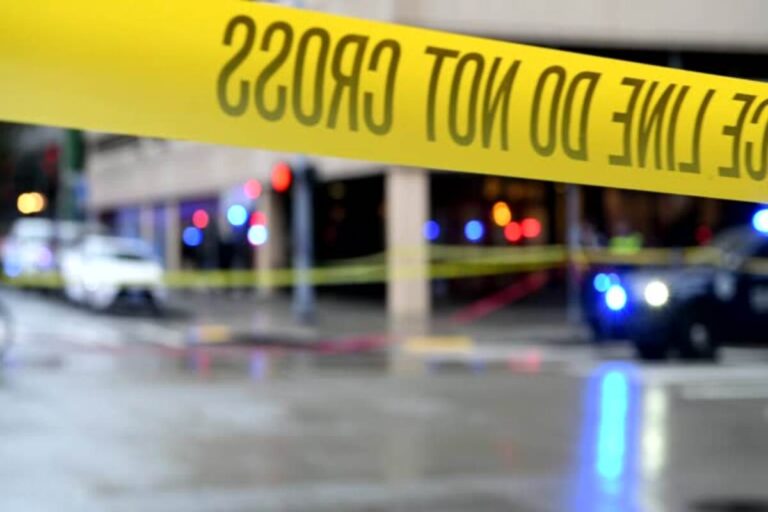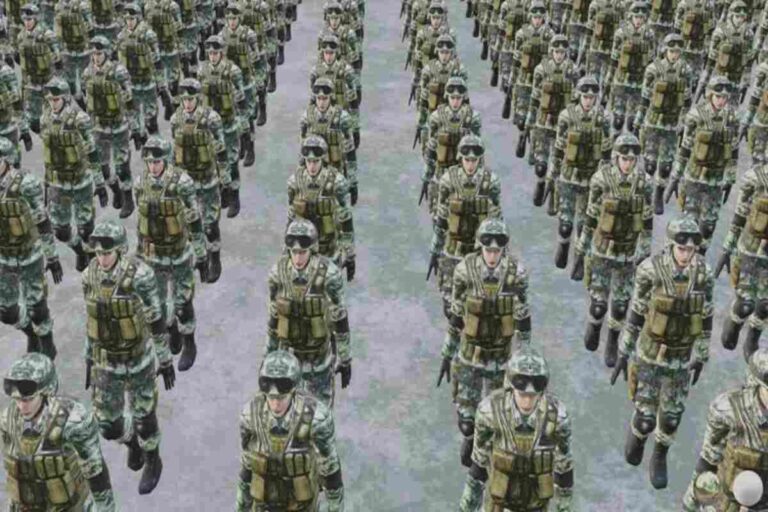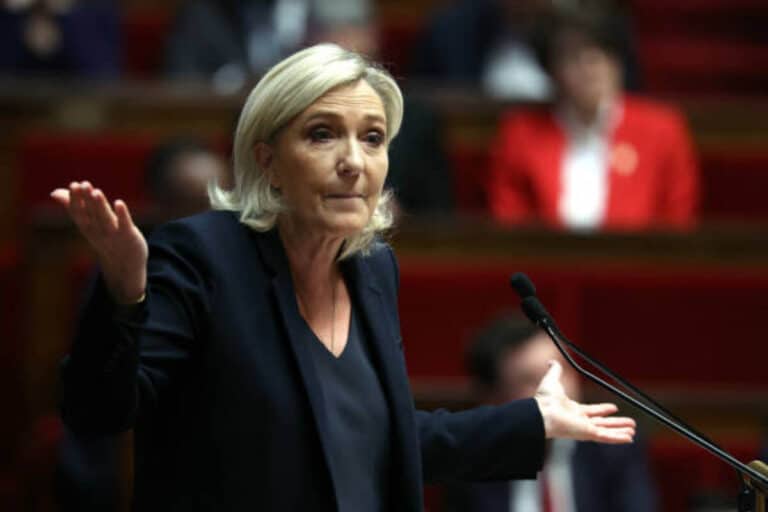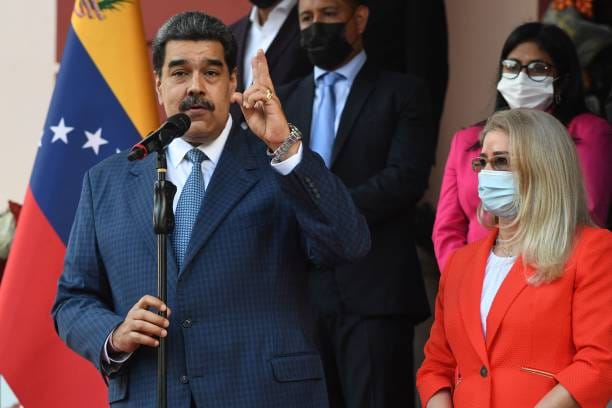

Venezuelan President Nicolas Maduro speaks with the press next to First Lady Cilia Flores (R) after holding a meeting with FIFA president Gianni Infantino (out of frame) at the Miraflores Presidential Palace in Caracas. (Photo by Federico PARRA / AFP) (Photo by FEDERICO PARRA/AFP via Getty Images)
(EPICSTORIAN) – The United States has raised its reward for information leading to the arrest of Venezuelan President Nicolás Maduro to $25 million, intensifying its pursuit of the embattled leader.
This announcement came on the same day Maduro was sworn in for a contentious third six-year term. The ceremony was marred by condemnation from the international community and rejection by the country’s opposition leaders, CNN reported.
Global Push for Accountability
The US also announced rewards for the capture or conviction of key Maduro allies, including a $15 million bounty on Defense Minister Vladimir Padrino and a separate amount targeting Interior Minister Diosdado Cabello.
These measures underscore Washington’s ongoing pressure campaign against Maduro’s administration, citing charges of corruption and “narco-terrorism” dating back to 2020.
The UK joined the international chorus by imposing sanctions on 15 high-ranking Venezuelan officials, including judges, military leaders, and security personnel.
Democratic Reform in Venezuela
According to the Foreign, Commonwealth, and Development Office, these individuals are responsible for undermining democracy, the rule of law, and human rights.
British Foreign Secretary David Lammy called Maduro’s regime “fraudulent,” adding that these sanctions aim to support democratic reform in Venezuela.
Similarly, the European Union extended its “restrictive measures” against Venezuela, citing the regime’s lack of progress toward restoring democracy. The bloc also sanctioned 15 more officials tied to Maduro’s administration. In Canada, Foreign Minister Mélanie Joly described Maduro’s actions as “shameless” and pledged continued pressure to combat the erosion of democratic rights in the country.
“Canada will not tolerate the repression of Venezuelan citizens seeking to express their rights,” Joly affirmed.
A Defiant Maduro
President Maduro, 62, dismissed these allegations as baseless attacks orchestrated by Western nations. Speaking during his inauguration, he promised a “new period of peace, prosperity, and equality” for Venezuela.
“I swear by history, I swear by my life, and I will fulfill it,” Maduro declared. However, his critics argue that economic mismanagement and systemic corruption—not international sanctions—are the primary causes of Venezuela’s ongoing economic collapse.
Maduro’s third term follows a highly contested election on July 28, which saw widespread international rejection. The US, Brazil, Colombia, and several other nations refused to recognize the election results, with many backing exiled opposition leader Edmundo González as the legitimate president-elect.
González, who fled to Spain in September, has been actively seeking international support for democratic reforms in Venezuela.
Limited Support and Isolation
Maduro’s inauguration was a tightly controlled event, with foreign journalists barred from entering the country and most accredited Venezuelan media excluded from the proceedings.
Only the presidents of Cuba and Nicaragua attended the ceremony, reflecting Maduro’s shrinking list of global allies. Despite retaining support from countries like Russia, China, and Iran, Venezuela remains increasingly isolated on the world stage.
Meanwhile, González continues to rally international backing, meeting with leaders across the Americas to advocate for democratic change. In response, Maduro’s government issued an arrest warrant for González and offered a $100,000 reward for information leading to his capture. This stark contrast highlights the deep divisions within the country and its diaspora.
A History of Accusations
The US charges against Maduro and his allies include allegations of using cocaine as a weapon to undermine American public health. The accusations date back to 2020, when the US Department of Justice indicted Maduro for “narco-terrorism.”
Despite these claims, Maduro has repeatedly denied involvement in drug trafficking and corruption, describing them as part of a US-led imperialist campaign to destabilize Venezuela.
Adding to the tension, the US re-imposed oil sanctions on Venezuela last year after briefly easing them in hopes of encouraging democratic elections. Maduro has labeled these sanctions as illegitimate, arguing they exacerbate the nation’s economic woes.
However, critics point to internal corruption and governance failures as the root causes of Venezuela’s economic decline.
International Appeals for Justice
On the same day as Maduro’s inauguration, UN Secretary-General António Guterres urged the release of all individuals “arbitrarily detained” since the contentious elections. Human rights organizations have also criticized the Venezuelan government for its suppression of dissent, further amplifying calls for international intervention.
